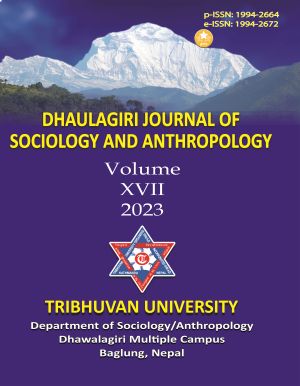To Go to Work or Stay at Home for Better Conjugal Relations? Reflection from Married Women of Kathmandu Valley, Nepal
DOI:
https://doi.org/10.3126/dsaj.v17i01.46823Keywords:
empowerment, marital adjustment, Nepal, working statusAbstract
Marital adjustment implicates both the family and professional life of women. It has, however, not received adequate research attention in Nepal. This paper assesses the marital adjustment of working women and housewives in Kathmandu, Nepal, using the Marital Adjustment Inventory developed by Kumar and Rohatgi (1976). Data are collected using face-to-face interviews with 270 women selected through purposive-cluster sampling. The data were analyzed using descriptive and bi-variate level inferential statistics. Most respondents were well-educated young Newa community women living in joint families. Married women of Kathmandu Valley enjoy fairly well-adjusted conjugal union, with even better adjustment of working women since their earnings act as power. The bi-variate level test indicated a significantly associated between age at marriage, working status, monthly income, and type of family with marital adjustment. However, the prevailing scholarship indicates that factors affecting marital adjustment are not universal. Rather, they are context-specific. Working women of joint families showed higher levels of marital adjustment, indicating the strength of power (money as resources) and socio-cultural norms for family bonds for family happiness. While these findings seek policy recognition and practical translation of these elements under a wider approach to women’s empowerment and family well-being, we also recommend women go to work rather than stay at home, for a better conjugal relationship.
Downloads
Downloads
Published
How to Cite
Issue
Section
License
Copyright (c) 2023 Rishikesh Pandey, Prabha Bhattarai

This work is licensed under a Creative Commons Attribution-NonCommercial-ShareAlike 4.0 International License.




